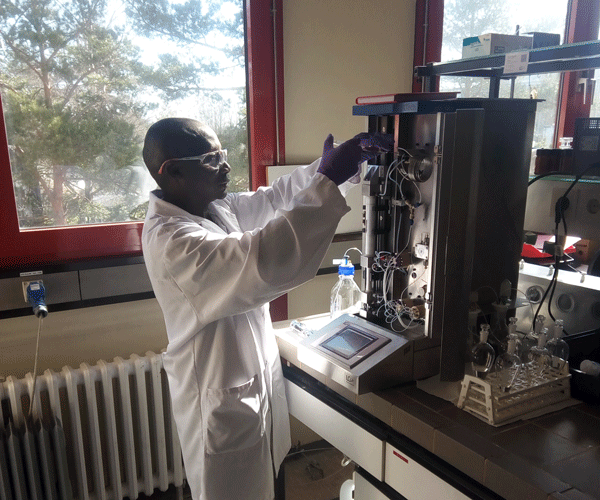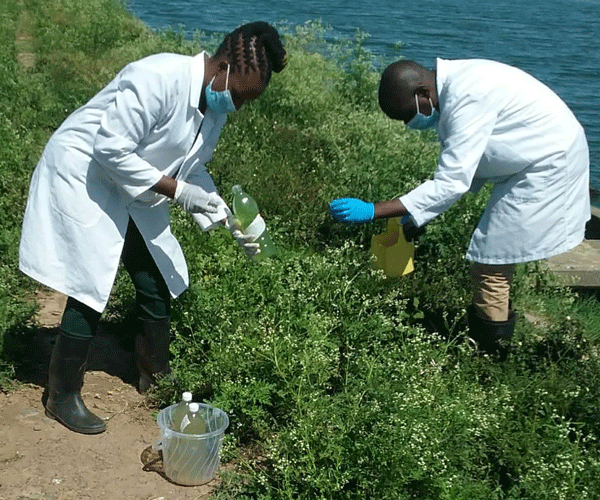It is said that Winston Churchill named Uganda "The Pearl of Africa", not only for its stunning sceneries and a pleasant climate but also for its friendly people. Rich in fruits—there are more than 50 kinds of bananas—and stunning landscapes, Uganda is, indeed, a tropical paradise.
As it's happening almost everywhere, however, Uganda is experiencing a worrying accumulation of pollutants in the soil and water, which damage the ecosystems and pose a severe danger to the country's people, in particular children and pregnant women.
Patrick Ssebugere, a Ugandan chemist and the Head of the Laboratory of Environmental Chemistry and Toxicology at Makerere University, in Uganda, is developing cheap and environmentally friendly techniques that can be used to ensure the safety of foods and the absence of contaminants from the soil, surface waters and the atmosphere.
"Science is a core element of national development for economies like Uganda's, and chemistry is at the centre of most reactions occurring in nature and in industrial settings, where foods and beverages are produced and treated for a long shelf life," Ssebugere noted. "This is why, since my early years at high school, I decided to pursue a career in science, and in chemistry in particular, because I want to make a difference in Uganda."
His curriculum is indeed outstanding: as a student, before earning his PhD in 2015 from Lappeenranta University of Technology, in Finland, he had already started building professional connections with Chinese laboratories.
In 2013 and 2014, he visited the State Key Laboratory of Environmental Chemistry and Ecotoxicology of the Chinese Academy of Sciences (CAS), in Beijing, China, sponsored by a TWAS PhD Fellowship. In April 2015, he returned to Makerere University as an Assistant Lecturer and, in July 2016, he was promoted to the rank of Lecturer. In November 2021, he became a Senior Lecturer.
In his relatively short career, he has been awarded more than 10 research grants and many honours. In 2019, he received a Postdoctoral Research Fellowship at Helmholtz Zentrum München, the German research centre for environmental health, offered by TWAS and the Deutsche Forschungsgemeinschaft, a self-governing organization for science and research in Germany.
In 2020, he received a two-year grant sponsored by TWAS and the Swedish International Development Cooperation Agency (Sida) that he is using to develop a project titled “Prenatal exposure to undesirable chemicals and child health”.
"Women in Uganda are particularly exposed to noxious pollutants," Ssebugere explained. "Many of them work in factories that receive waste from developed countries and recycle electronic components from computers, mobile phones, fridges and TVs. The waste often contains persistent organic pollutants that remain in the environment and accumulate through the food web."
Pollutants are ubiquitous: they hide also in the firewood burnt for cooking and in the coatings used to paint houses. These substances bind especially to proteins, organic compounds that women consume in large quantities during pregnancy, thus putting them, their foetuses and their newborns at a higher risk of bioaccumulation—the accumulation over time of a substance and especially a contaminant in a living organism.
This observation has prompted Ssebugere and his team to collect breast milk, blood and placental tissue samples since 2017, after receiving another two-year grant from the Carnegie Corporation of New York to look for a potential association between environmental pollutants and health conditions in women and children.
To tackle indoor pollution caused by cooking, the scientist is also studying the production of biomethane (a form of renewable natural gas) that is obtained from the discarded peels of a variety of bananas called matooke, of which Uganda is one of the largest producers in East Africa.
The TWAS-Sida grant he has been awarded has served several purposes: not only it has enabled Ssebugere's team to establish robust research networks with other universities in Africa and overseas, strengthening the South-South and North-South cooperation.
It was also instrumental to the work of Kenyan researcher Emily Ngeno, a member of his team whose research benefited from the chemicals and the equipment bought through TWAS-Sida grant. Ngeno's PhD, instead, was also funded by a TWAS-Organization for Women in Science for the Developing World programme. Along with her academic studies, Ngeno is also gathering practical experience at Masinde Muliro University of Science and Technology, in Kenya, and at the Department of Chemistry at Makerere University.
Also, through the work of Juma John Moses Abayi, a young scientist from the University of Juba in South Sudan, who completed his MSc in chemistry last year at Makerere University under Ssebugere’s supervision, and thanks also to the equipment bought with the TWAS-Sida grant, Ssebugere and his team at Makerere University submitted three grant application proposals to other funding institutions and published four articles in peer-reviewed journals.
Ssebugere's scientific interests are also expanding, as, currently, he is working on new extraction techniques for pesticide analysis in food products, and devising new methods to quantify the levels of microplastics in surface waters, fish, sediments and living organisms from the Uganda side of the Lake Victoria basin.
"The harmful effects of ingested microplastics are well known," he commented. "However, the studies on the extent of microplastics pollution in African fresh waters such as Lake Victoria are still scarce, and the COVID-19 pandemic triggered an unprecedented use of plastic materials that are now in the environment," observed Ssebugere, who also highlighted that this project aims to attain United Nations Sustainable Development Goal 14 on the conservation and sustainable use of life below water.
Since pollutants are everywhere, Ssebugere is also monitoring the western Uganda region, where deep oil fields are luring the interest of international oil companies. Drilling should start in a near future, posing a threat to the entire area.
"Drilling activities bring many challenges, as they release heavy metals and polycyclic aromatic hydrocarbons into the soil and cause long-lasting contaminations. And the same contaminants may leak into the lake basins, with devastating consequences for the population," he said. He and his team are now carrying out preliminary tests to have a snapshot of the current situation, collecting data to advise the Government when the drilling starts.
On the COVID-19, Ssebugere opened yet another field of investigation: Through a grant from the Ugandan Presidential Scientific Initiative on Epidemics (2020–2023), he now aims at identifying low-cost, effective biomarkers for the early detection of COVID-19 and other respiratory viruses causing pneumonia. In addition, he plans to establish a biomarker research facility and has already two promising candidate biomarkers for a patent in the pipeline.
Mentoring students is another activity Ssebugere is committed to: He supervised over 10 postgraduate students (PhD and MSc) and was supervising, at the time of writing, more than nine graduate students. His teachings gave good outcomes: some of his former students are now performing research at top universities in Australia, China, India, Poland, the Republic of Korea, the United States and the United Kingdom, or hold key positions in corporate companies.
Not surprisingly, the majority of his graduate students are females. "I strongly believe that society should engage in promoting the economic empowerment of women, especially in sub-Saharan Africa," he said. "And I do my best to help them increase their visibility, making them better qualified for higher positions of responsibility also in science, technology, engineering and mathematics." Another engagement in line with Sustainable Development Goal 5 on gender equality.
Ssebugere also participates in outreach workshops aimed at transferring knowledge to support local communities in environmental conservation and wastewater management.
His know-how is well accredited in Uganda. Since 2015, he is a member of two committees in the Department of Chemistry of Makerere University; since 2021, he is Chairperson of the Technical Committee of the Uganda National Bureau of Standards for the standardization of paints, varnishes and related products in East Africa.
Ssebugere also received a TWAS-CAS fellowship in 2013, which enabled him to build an international network of collaborations, and offered him opportunities to expand his work.
And at another TWAS-supported activity, TWAS-American Association for the Advancement of Science science diplomacy course that he attended in 2018, he enhanced his communication skills, which he is now putting to good use acting as an advisor for policymakers and the Government of Uganda.
What about his future plans? Too many, indeed. They range from writing textbooks on environmental science and on his own experiences as a scientist working in a developing country, to establishing a centre of excellence in environmental chemistry and ecotoxicology for East African countries.
"The North spends millions of dollars to train scientists from sub-Saharan Africa: training them in the region would be cheaper," he commented. "Besides, most of the researchers who receive training abroad hardly return home. Keeping them in the region would reduce the brain drain that affects Uganda."
Cristina Serra

